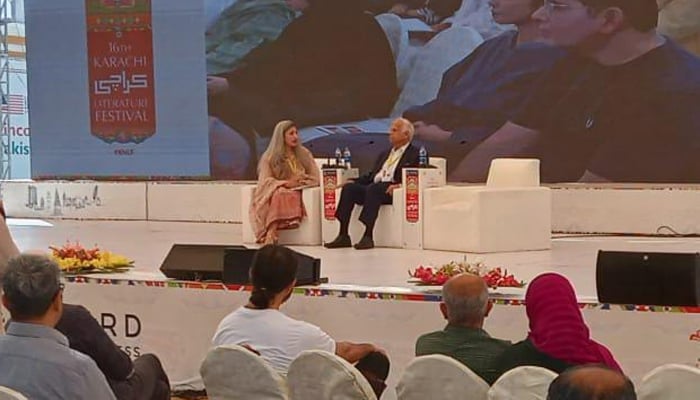KLF 2025: Experts raise concerns over sharp surge in Pakistan's population
Special session on strengthening Pakistan-Bangladesh bilateral ties remains highlight on third and final day of 16th Karachi Literature Festival
February 09, 2025

KARACHI: A thought-provoking discussion on Pakistan’s rapidly growing population and its implications for the country’s future took centre stage at the 16th Karachi Literature Festival.
The session brought together a distinguished panel of experts to analyse the challenges and opportunities associated with the country’s demographic trends.
Moderated by Naeem Sadiq, the session featured Dr Azra Fazal Pechuho, Lubna Naz, Rehana Ahmed, and Khalid Masud. The panellists deliberated on whether Pakistan’s demographic trajectory is a ticking time bomb or a potential economic dividend, emphasising the immediate need for effective policy implementation and strategic planning.
Pakistan, currently the world’s fifth most populous nation, faces several alarming statistics. Over 26 million children are out of school, 3.3 million are involved in child labor, 1.2 million beg on the streets, and 12 million suffer from malnutrition. An estimated 17,554 babies are born daily in the country. While the global total fertility rate (TFR) has declined from 4.8 to 2.2 over the past five decades, Pakistan’s TFR remains at an unsustainable 3.6, necessitating the construction of 87 new schools every day.
In contrast, Pakistan’s regional counterparts have significantly reduced their TFRs: Bangladesh (1.9), India (2), Nepal (2), Turkey (1.6), Iran (1.7), and Taiwan (0.87). All 27 EU countries maintain TFRs below 2, with France leading at 1.79.
Dr Pechuho underscored the critical role of the private healthcare sector in addressing population challenges. She highlighted that over 70% of Pakistan’s population relies on private healthcare services, yet the sector primarily focuses on revenue-generating curative services rather than national priorities like family planning.
“The government must take the lead in setting national goals for the private health sector," she said, adding that every clinic in Pakistan should provide family planning counselling and awareness services. She further pointed out that contraceptives are either donor-funded or imported and classified as luxury goods, making them unaffordable for many due to high sales tax.
The panellists stressed that investments in education, healthcare, and family planning could transform Pakistan’s population into a valuable asset rather than a burden. They called for a unified strategy between the public and private sectors to address these pressing issues and harness the potential of the country’s youth.
Ikram Sehgal calls for cooperation with Bangladesh
A special session on strengthening Pakistan-Bangladesh bilateral relations remained the highlight of the third and final day of the 16th Karachi Literature Festival. The session featured a thought-provoking address by writer Ikram Sehgal, who emphasised the need for visa-free travel between Pakistan and Bangladesh to strengthen people-to-people connections and promote goodwill.

The session reflected on how relations between the two countries improved following the assassination of Sheikh Mujibur Rahman. A significant moment was recalled when former prime minister Nawaz Sharif visited Dhaka to attend a cricket match. Despite concerns from the administration about possible protests, Nawaz received a warm and enthusiastic welcome from the crowd, demonstrating the deep bonds between the people of both nations.
A major focus of the discussion was the plight of stranded Biharis in Bangladesh. Sehgal said that these individuals are Pakistanis and have the right to return to their homeland. He urged both governments to grant Biharis the freedom to choose whether to return to Pakistan or remain in Bangladesh.
He also shared his personal experiences, recalling how he witnessed the massacre of Biharis while flying a helicopter over what was earlier East Pakistan. Bihari neighbourhoods in areas like Chittagong and railway colonies were targeted and set on fire, he said.
It was acknowledged that both sides committed excesses during the conflict, and lessons must be learned from that tragic chapter in history.
In a positive development, two female and one male cadet from Bangladesh are currently receiving training at the Pakistan Military Academy. This cooperation reflects the evolving relationship and mutual trust between the two countries.
Providing military training to Bangladeshi cadets demonstrates a forward-thinking approach to strengthening bilateral ties, he added.
Murtaza Wahab for Karachi's transformation
Karachi Mayor Barrister Murtaza Wahab shared his ambitious vision for the future of Karachi, focusing on sustainable development, technological innovation, and inclusive urban growth.
Speaking to a diverse audience at the KLF today, Wahab highlighted the city's longstanding challenges and outlined transformative solutions to ensure a better quality of life for all its residents.

"The way and manner the population of Karachi has increased, that surge has not been complemented in the same manner with respect to the facilities that should have been available," he said.
"Our vision is to address the water issues. I suggest we adopt technology to recycle and reuse water for industrial use and protect marine life, while also contributing to save the Arabian Sea."
As part of his long-term plan to improve Karachi's urban landscape, the mayor highlighted the need to eradicate slums from the city, citing successful examples from Jakarta's urban planning model.
He announced future projects focused on building vertical structures to provide modern housing for those living in underdeveloped areas.
"Vertical structures will be developed to improve the living standard of people currently living in shabby conditions. The land will still belong to KMC [Karachi Metropolitan Corporation], the maintenance of the building will come from the private sector, and the residents will get a respectable place to live," he added.
Defending the role of public-private partnerships, he highlighted the KMC Nursing School Initiative — an innovative project providing free-of-cost education to 100 students under the KMC Scholarship Programme. These students, upon completion of their education, will have guaranteed jobs in one of the 14 hospitals operated by KMC.
"This initiative is a step towards improving public healthcare while empowering youth through quality education and job security," he concluded.









